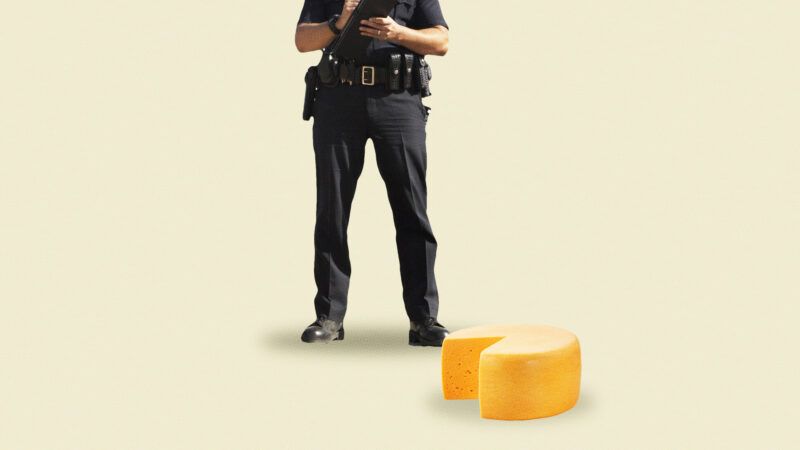Border Officials Took This Woman's Cheese and Fined Her $1,000
Their case for the seizure is full of holes.

Last week, American officials at a crossing on the U.S.-Mexico border conducted an unusual seizure: over 100 pounds of undeclared cheese.
Customs and Border Protection (CBP) officers at the Paso Del Norte crossing in El Paso, Texas, stopped a U.S. citizen from Albuquerque as she arrived from Mexico. The driver declared 10 wheels of cheese, but an officer conducted an examination of her car and discovered an additional 50 wheels stashed in the back under blankets.
"Travelers can import cheese commensurate with personal consumption levels," CBP El Paso Port Director Ray Provencio said in a statement. "A few wheels would generally be fine but not 60. It was undeclared and that amount would be a commercial quantity and additional reporting requirements would apply."
Last week's cheese seizure would've made at least some sense if CBP had been able to point to any pressing health or safety risk posed by the dairy. But CBP didn't indicate that it seized all that undeclared cheese over any specific health or safety concerns. Rather, CBP spokesperson Roger Maier tells Reason it's because "132 pounds of cheese is well beyond personal consumption levels." That, along with the fact that the cheese was hidden and most of the shipment was undeclared, "pointed to a commercial importation," says Maier.
It's undeniably a lot of cheese—but officials seem to be inferring that the woman intended to sell it rather than stockpile or gift it. For carrying the contraband dairy, the woman was fined $1,000, and CBP ultimately destroyed the undeclared wheels.
When asked about the public benefit of the cheese seizure, Maier says that "it demonstrates to the public that consequences will be applied when violators are encountered." Enforcement "helps establish and build upon the public trust bestowed upon CBP," Maier explains, "as we continue to perform our primary homeland security mission."
A quick scroll through CBP's "agriculture" tag reveals plenty of quirky seizures with questionable relevance to homeland security. The agency has bragged about thwarting shipments of bologna, sausages, dried beef, four dragon fruits, more bologna, mangos, and a few pounds of tomatoes. Failing to declare food items can result in fines of up to $10,000.
These seizures are routinely marketed as efforts to stop invasive pests or diseases from reaching American soil. It's a valid concern, but one that isn't always backed by airtight logic on CBP's part. Los Angeles Times columnist Frank Shyong wrote about seizures of prepackaged, branded Chinese jerky products in March and documented his attempts to get federal officials to explain why they needed to be confiscated.
"I called Jaime Ruiz, a spokesman for CBP…Ruiz was unable to explain the connection between the seizures and infectious disease," wrote Shyong. "He said the meat products were seized because they skirted import tariffs, did not obtain a USDA certificate and thus did not undergo a separate food safety inspection process in the U.S."
Ruiz then directed Shyong to the Department of Agriculture, where spokesman William Wepsala said that diseases like African swine fever (which does not infect people) "can persist for weeks in undercooked and processed meats." But, Shyong wrote, Wepsala couldn't explain the link between jerky produced for human consumption and its potential to affect swine populations.
That doesn't inspire great confidence in some of the regulations that keep people from bringing delicious foodstuffs back to the United States. Nor does it help underline the need for fines of up to $10,000 for undeclared food. In any case, it's difficult to justify the claim that taking a woman's cheese is preserving homeland security.

Show Comments (75)